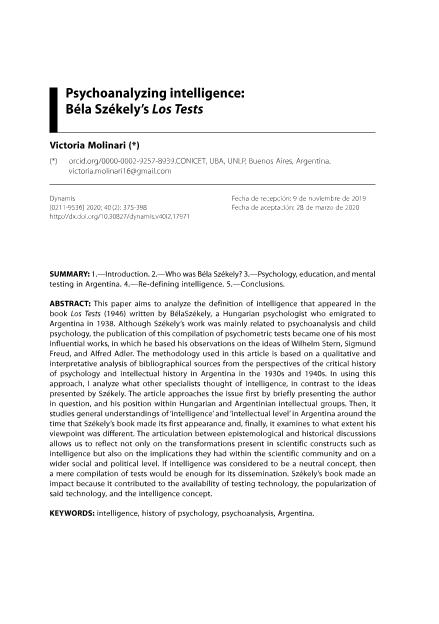Artículo
Psychoanalyzing intelligence: Béla Székely’s Los Tests
Fecha de publicación:
12/2020
Editorial:
Universidad de Granada
Revista:
Dynamis
ISSN:
0211-9536
Idioma:
Inglés
Tipo de recurso:
Artículo publicado
Clasificación temática:
Resumen
This paper aims to analyze the definition of intelligence that appeared in the book Los Tests (1946) written by Béla Székely, a Hungarian psychologist who emigrated to Argentina in 1938. Although Székely’s work was mainly related to psychoanalysis and child psychology, the publication of this compilation of psychometric tests became one of his most influential works, in which he based his observations on the ideas of Wilhelm Stern, Sigmund Freud, and Alfred Adler. The methodology used in this article is based on a qualitative and interpretative analysis of bibliographical sources from the perspectives of the critical history of psychology and intellectual history in Argentina in the 1930s and 1940s. In using this approach, I analyze what other specialists thought of intelligence, in contrast to the ideas presented by Székely. The article approaches the issue first by briefly presenting the author in question, and his position within Hungarian and Argentinian intellectual groups. Then, it studies general understandings of ‘intelligence’ and ‘intellectual level’ in Argentina around the time that Székely’s book made its first appearance and, finally, it examines to what extent his viewpoint was different. The articulation between epistemological and historical discussions allows us to reflect not only on the transformations present in scientific constructs such as intelligence but also on the implications they had within the scientific community and on a wider social and political level. If intelligence was considered to be a neutral concept, then a mere compilation of tests would be enough for its dissemination. Székely’s book made an impact because it contributed to the availability of testing technology, the popularization of said technology, and the intelligence concept.
Palabras clave:
ARGENTINA
,
HISTORY OF PSYCHOLOGY
,
INTELLIGENCE
,
PSYCHOANALYSIS
Archivos asociados
Licencia
Identificadores
Colecciones
Articulos(SEDE CENTRAL)
Articulos de SEDE CENTRAL
Articulos de SEDE CENTRAL
Citación
Molinari, Victoria; Psychoanalyzing intelligence: Béla Székely’s Los Tests; Universidad de Granada; Dynamis; 40; 2; 12-2020; 375-398
Compartir
Altmétricas




